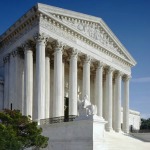August 2, 2013 Richmond, VA. – The Virginia Christian Alliance (VCA) has filed a friend-of-the-court brief with the United States Supreme Court in the highly publicized public prayer case of Town of Greece v. Galloway. The Virginia Christian Alliance is asking the High Court to reevaluate its current framework for deciding cases involving religious speech or symbols in public settings and to return to a historically correct interpretation of the Establishment Clause to prohibit only government policies that coerce citizens to support or practice religion.
Donald N. Blake, Chairman and President of Virginia Christian Alliance.
“Contrary to what is suggested by some of the Supreme Court’s prevailing analyses, the role of the judiciary is not to protect litigants’ feelings, but to protect liberty.
Those who feel offended by references to faith in the public square can certainly vent their policy views at election time, but they should not be given a court-enforced heckler’s veto and allowed to force religion into the private recesses of society.”
“Rita Dunaway, Vice President of Virginia Christian Alliance and the author of the friend-of-the-court brief, discusses this critical issue below: are we a nation founded on liberty or “feelings”?”
A Nation of Liberty or a Nation of Feelings?
Friends of liberty beware: judicial doctrines built upon contemporary America’s unhealthy focus on feelings leave fundamental freedoms at risk.
On Friday, Virginia Christian Alliance (VCA) filed a friend-of-the-court brief with the United States Supreme Court in the hotly contested public prayer case of Town of Greece v. Galloway. We are asking the High Court to reevaluate its current, perception-based framework for deciding cases involving religious speech or symbols in public settings and to return to a historically correct interpretation of the Establishment Clause to prohibit only government policies involving religious coercion.
The case arose out of the United States Court of Appeals for the Second Circuit, which held that the Town of Greece, New York, had created an unconstitutional “establishment” of religion by allowing local clergy members to offer invocations at Town meetings on a voluntary, non-discriminatory basis. The Court held that this policy violated the Establishment Clause because, in fact, most of the clergy members who volunteered to pray represented the Christian faith. This was unacceptable, held the federal court, because non-Christians may have felt left out. Attorneys for Alliance Defending Freedom are representing the Town in the appeal to the United States Supreme Court.
If we can trust James Madison’s explanation to the First Congress, the liberty protected by the Establishment Clause is the freedom from being coerced to support or practice religion. But under the Supreme Court’s modern interpretation of the Clause, it prohibits any word or act which a bystander might perceive as a message of government “endorsement” of religion.
In our brief, we argue that this reading is entirely at odds with America’s unmistakably religious heritage and the actual practices of those who drafted, debated, and adopted the First Amendment. In fact, an intellectually honest application of the Court’s modern Establishment Clause doctrine would result in the invalidation of countless national traditions, including the Pledge of Allegiance, Presidential Thanksgiving Proclamations, Supreme Court opening statements, the National Day of Prayer, and the national motto, “In God We Trust,” which is inscribed upon various government buildings and currency.
While the Supreme Court’s decision in this case is poised to be a landmark ruling on the practice of public invocations, the impact of this case may actually reach much further than the issue of public prayer.
The case is a perfect example of the impact our culture’s obsession with feelings has had on judicial doctrine. Emotions–subjective, unknowable, and transitory as they may be—are now a determining factor in constitutional analysis. Consider, for instance, the following quote which the Second Circuit offered as its rationale for striking down the Town’s perfectly neutral invocation policy (which, remember, involves prayers offered by private citizens): “People with the best of intentions may be tempted, in giving a legislative prayer, to convey their views of religious truth, and thereby run the risk of making others feel like outsiders.”
This basis for constitutional decision-making should give pause to the student of American history. Is this the nation of freedom birthed through the labors of men like George Washington, John Adams, James Madison and Thomas Jefferson? Were these men, who risked being hanged as traitors for their efforts, really concerned with securing the psychological well-being of their fellow man by ensuring that no person would ever be permitted to express in a government setting an idea that might offend another person?
No. Their work, and their legacy, was about securing liberty. And liberty finds no refuge in a jurisprudence of feelings.
Freedom-loving Americans should hope that the Court will use this case to reject the idea that my liberty is endangered when I don’t like the ideas you express through spoken words. Your words pose no threat to my liberty, but the judiciary has begun to allow my feelings about those words to demolish your liberty.
In their genius, our Founding Fathers did not leave offended separationist citizens without remedy for their hurt feelings. Those who feel offended by references to faith in the public square can certainly vent their policy views at election time. But when the judiciary indulges litigants’ desires to gag religious citizens or public officials and to force religion into the private recesses of society, it is giving them a court-enforced heckler’s veto over the liberty of others.
It is the hope of VCA and the organizations and legislators who joined us in this brief that the High Court will seize upon this opportunity to serve the interest of liberty by rejecting a jurisprudence of feelings.
We would like to thank the following organizations and legislators for joining the brief:
- Concerned Women for America
- The Congressional Prayer Caucus Foundation
- The Frederick Douglass Foundation of Virginia
- The Valley Family Forum
- Fredericksburg Rappahannock Evangelical Alliance
- The Black Robe Regiment of Virginia
- Delegate Richard “Dickie” Bell
- Senator Dick Black
- Delegate Ben Cline
- Delegate Todd Gilbert
- Senator Emmett Hanger
- Delegate Steve Landes
- Delegate Bob Marshall
- Senator Steve Martin
To read the brief in its entirety, click ![]() here178.91 KB. To contribute to VCA and assist us as we continue in our work to honor the legacy of our Founding Fathers, click here.
here178.91 KB. To contribute to VCA and assist us as we continue in our work to honor the legacy of our Founding Fathers, click here.
 Rita Dunaway, graduated summa cum laude from West Virginia University in 1998, having earned a B.S. in Journalism and a B.A. in Political Science simultaneously. She then attended law school at Washington and Lee University School of Law, graduating cum laude in 2001. Rita practiced law for a short time in a general civil practice in Harrisonburg before becoming a full-time staff attorney at The Rutherford Institute in Charlottesville, and currently serves as Vice-President of Public Policy for the Virginia Christian Alliance.
Rita Dunaway, graduated summa cum laude from West Virginia University in 1998, having earned a B.S. in Journalism and a B.A. in Political Science simultaneously. She then attended law school at Washington and Lee University School of Law, graduating cum laude in 2001. Rita practiced law for a short time in a general civil practice in Harrisonburg before becoming a full-time staff attorney at The Rutherford Institute in Charlottesville, and currently serves as Vice-President of Public Policy for the Virginia Christian Alliance.
